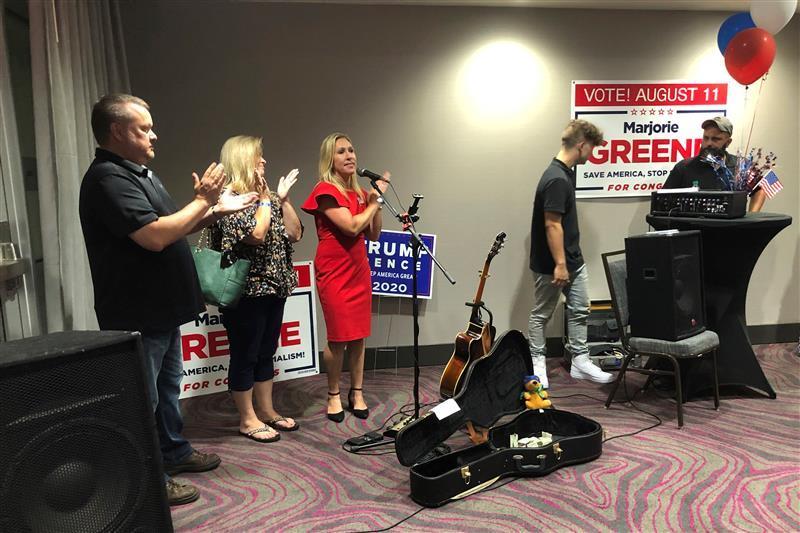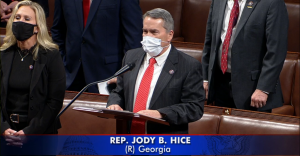
Caption
Unlike companies like AT&T, Coca-Cola, Marriott, and GE, some of Greene’s largest donors are cheering on her continued false claims that former President Donald Trump won the November election.
Credit: Mike Stewart/AP

Unlike companies like AT&T, Coca-Cola, Marriott, and GE, some of Greene’s largest donors are cheering on her continued false claims that former President Donald Trump won the November election.
For some Republicans propagating claims the presidential election was stolen, a corporate donation freeze might be a real threat to their future political fortunes.
Not so for the most vocal election denier in Georgia’s congressional delegation.
Rep. Marjorie Taylor Greene, who during her first weeks in Congress has placed herself at the forefront of the objections to certifying the results of the 2020 presidential election — and even filed articles of impeachment against President Joe Biden — doesn’t have much in the way of corporate PAC money in her fundraising coffers to begin with, according to a Recorder analysis of her campaign records.
And unlike companies like AT&T, Coca-Cola, Marriott, and GE, some of Greene’s largest donors are cheering on her continued false claims that former President Donald Trump won the November election, illustrating the perverse incentive facing newer members of Congress who find viral stardom in denying the legitimacy of a democratically elected president.
Take the Howalt family, owners of Dalton’s Textile Rubber & Chemical Co., a multinational and multi-million dollar company based in Greene’s district that manufactures compounds used to make backings for rugs, among other things. Cynthia Howalt was the largest individual donor to Greene’s campaign infrastructure, giving a $125,000 donation in November to the Stop Socialism Now PAC, a Super PAC tied to Greene. Howalt donated another $2,800 to Greene’s campaign, and two other individuals identified in FEC records as employees of the textile company donated lesser sums.
When contacted via email, Frederick “Chip” Howalt, Cynthia’s husband and president of the company, said that not only will his family continue donating to Greene, they will refuse to donate to any candidate who doesn’t claim the election was stolen.
“We are not re-thinking our support of [Greene] one bit. If anything, we’ll find a legal way to increase it,” he said in an email. “The only financial support our Family will pull will be from ANY RINO’s [Republicans in name only] complicit in blocking investigations into Voter Fraud and Irregularities (GA had many) and not Objecting to confirm the Biden Electors where practical and advisable to do so.”
Bill Pope, the owner of Texas-based NCIC, a paid phone and messaging system for prisoners, said he won’t stop donating to Greene either in the wake of her actions following the Capitol attack.
“I’ll donate. That’s not stopping me. That was the media pushing one riot versus another,” he said. “I mean, she didn’t pull her support for Trump. I’m kind of mad at [U.S. Senate Minority Leader Mitch] McConnell, but hey.”
Greene’s short tenure in Congress has been marked by one controversy after another. In addition to her history of posting videos supporting the conspiracy theory QAnon, CNN this week dug up Greene’s history of expressing support online for executing Democrats. The story even spurred a tweet from former Secretary of State Hillary Clinton, who wrote, “This woman should be on a watch list. Not in Congress.”
Still, it’s not clear any of this would affect Greene’s bottom line. Most of her campaign money actually came from her own bank account in the form of campaign loans. A lot of it also came from small-dollar donors.
On top of that, the donor rolls of Greene’s campaign committee, leadership political action committee and affiliated super PAC read like a who’s who of conservative rabble rousers, unlikely to be cowed by bad press for supporting Greene. There’s L. Lin Wood, the one-time celebrity attorney to the accused Atlanta Olympics bomber who has made a personal cause of egging on conspiracy theories and challenging the election of President Joe Biden.
There’s Thomas Beckwith, the Florida businessman who successfully challenged the Obama-era contraceptive rules. Citizens United donated, as did the Gun Owners of America, a farther-right version of the NRA. More than $90,000 in campaign money came through the House Freedom Fund, the political arm of the conservative House Freedom Caucus.
Koch Industries donated $5,000 to Greene’s campaign in June, but asked for it to be returned that same month after Greene’s prior comments in support of QAnon surfaced and caused controversy. FEC records do not show that the donation was returned.
But then there’s Alander Pulliam. The Los Angeles-based self-described entrepreneur and media mogul tried to donate $15,000 to Greene’s campaign the day after Election Day, inspired, he said in a telephone interview, by Greene’s objections to the election and her socially conservative views on issues like gay rights.
He didn’t know his gift far exceeded federal limits on individual donations, he said. Greene called him thanking him for his donation, but explaining why part of it was returned. Instead, she guided him to her PAC where she suggested he can re-donate. Pulliam recorded some of the conversation and shared it on his YouTube page, giving a rare insight into Greene’s private courtship of donors.
“I just wanted to call you and explain it, because I was just like, ‘Oh my god, this guy is so awesome and is helping so much.’ People all over the country are helping, but I was like, ‘I need to call him and let him know why I’m giving part of his money back and if he wanted to still help, what he can do,’” Greene can be heard telling Pulliam over the phone in the video.
In the end he gave $5,000 each to Greene’s super PAC and leadership PAC and smaller sums to the campaign.
Pulliam donated because he launched a longshot bid for the presidency, and said he hoped to collaborate with Greene, perhaps on a campaign event in the Atlanta area where he used to live.
The 32-year-old has since reflected on the election and said he doesn’t think the presidency was stolen anymore. And he now regrets his donation — not because of Greene’s anti-democratic rhetoric, but because he said Greene ghosted him after taking his money.
“She made it seem like I gave her just everything and I just fulfilled the dream that she needed to be fulfilled — and I didn’t get anything,” Pulliam told the Recorder. “I can’t even get a tweet. For $15,000 you would think I could get a text message back or something.”
“I feel like, you know, I donated to someone and they had no intentions of really tendering or delivering what they said,” he explained. “When I tried to call her back she never picked up, and all of a sudden someone else reached out like, ‘Oh I’m reaching out on behalf of,’ you know? I’m like, ‘Okay, well she said she was going to answer my phone call and do a little bit of stuff with me, but that never happened.’”

Georgia Congresswoman Marjorie Taylor Greene wore a mask as required in the U.S. House June 6 as she and Rep. Jody Hice objected to the certification of Joe Biden’s Electoral College win. Greene declined a mask while sheltering with other lawmakers during the U.S. Capitol riot.
Greene’s situation stands in contrast to that of her delegation colleague Rep. Jody Hice, a Monroe Republican who stood beside her earlier this month during a joint session of Congress objecting to Georgia’s presidential election certification. Although he has taken money from some of the same conservative donor groups as Greene, his campaign also benefited from the financial support corporate political action committees usually bestow on entrenched incumbents.
He’s taken thousands from Home Depot, AT&T, AFLAC, Cox Enterprises and UPS — all companies that have paused donations or announced they will rethink giving to politicians in the wake of the Capitol attack.
That’s not unusual, said Brett Kappel, a campaign finance expert at the Washington, D.C. law firm Harmon Curran, who has advised PACs about their giving strategies. He said Greene’s lack of corporate PAC money more reflects the fact that she’s a new member of Congress. It will be more detrimental, he said, to people like Hice.
“The corporate PAC bans affect people who are incumbents, because people who just got elected, they didn’t get PAC money to run, by and large,” he said. “Very few of them got corporate PAC money.”
As members of Congress settle into incumbency, the corporate PAC money usually flows. Maybe not for Greene, but then again, with donors like Howalt, maybe she doesn’t need it to.
This story comes to GPB through a reporting partnership with Georgia Recorder.